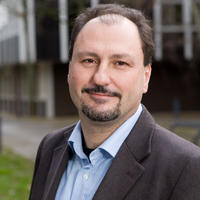
Scalable Software Testing and Verification Through Heuristic Search and Optimization: Experiences and Lessons Learned
Abstract:
Testing and verification problems in the software industry come in many different forms, due to significant differences across domains and contexts. But one common challenge is scalability, the capacity to test and verify increasingly large, complex systems. Another concern relates to practicality. Can the inputs required by a given technique be realistically provided by engineers? This talk reports on 10 years of research tackling verification and testing as a search and optimization problem, often but not always relying on abstractions and models of the system under test. Our observation is that most of the problems we faced could be re-expressed so as to make use of appropriate search and optimization techniques to automate a specific testing or verification strategy. One significant advantage of such an approach is that it often leads to solutions that scale in large problem spaces and that are less demanding in terms of the level of detail and precision required in models and abstractions. Their drawback, as heuristics, is that they are not amenable to proof and need to be thoroughly evaluated by empirical means. However, in the real world of software development, proof is usually not an option, even for smaller and critical systems. In practice, testing and verification is a means to reduce risk as much as possible given available resources and time. Concrete examples of problems we have addressed and that I will cover in my talk include schedulability analysis, stress/load testing, CPU usage analysis, robustness testing, testing closed-loop dynamic controllers, and SQL Injection testing. Most of these projects have been performed in industrial contexts and solutions were validated on industrial software. There are, however, many other examples in the literature, a growing research trend that has given rise to a new field of study named search-based software testing.
Bio:
Lionel C. Briand is professor and FNR PEARL chair in software verification and validation at the SnT centre for Security, Reliability, and Trust, University of Luxembourg. He also acts as vice-director of the centre. Lionel started his career as a software engineer in France (CS Communications & Systems) and has conducted applied research in collaboration with industry for more than 20 years.
Until moving to Luxembourg in January 2012, he was heading the Certus center for software verification and validation at Simula Research Laboratory, where he was leading applied research projects in collaboration with industrial partners. Before that, he was on the faculty of the department of Systems and Computer Engineering, Carleton University, Ottawa, Canada, where he was full professor and held the Canada Research Chair (Tier I) in Software Quality Engineering. He has also been the software quality engineering department head at the Fraunhofer Institute for Experimental Software Engineering, Germany, and worked as a research scientist for the Software Engineering Laboratory, a consortium of the NASA Goddard Space Flight Center, CSC, and the University of Maryland, USA.
Lionel was elevated to the grade of IEEE Fellow for his work on the testing of object-oriented systems.
He was recently granted the IEEE Computer Society Harlan Mills award and the IEEE Reliability Society engineer-of-the-year award for his work on model-based verification and testing. His research interests include: software testing and verification, model-driven software development, search-based software engineering, and empirical software engineering.
Lionel has been on the program, steering, or organization committees of many international, IEEE and ACM conferences. He is the coeditor-in-chief of Empirical Software Engineering (Springer) and is a member of the editorial boards of Systems and Software Modeling (Springer) and Software Testing, Verification, and Reliability (Wiley).
More details can be found on: http://people.svv.lu/briand/